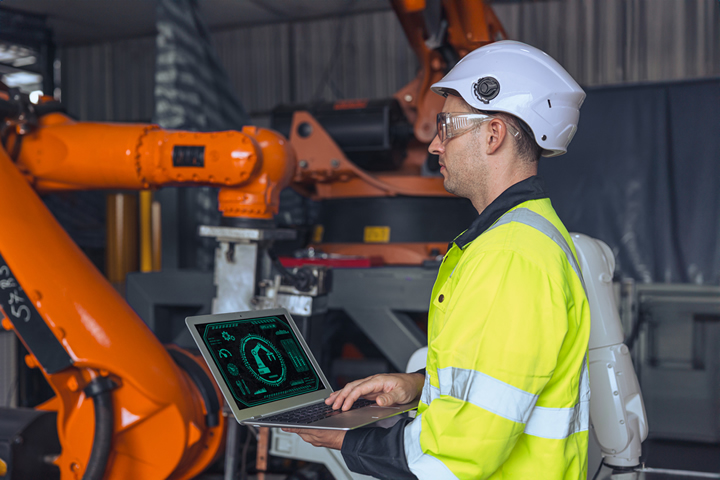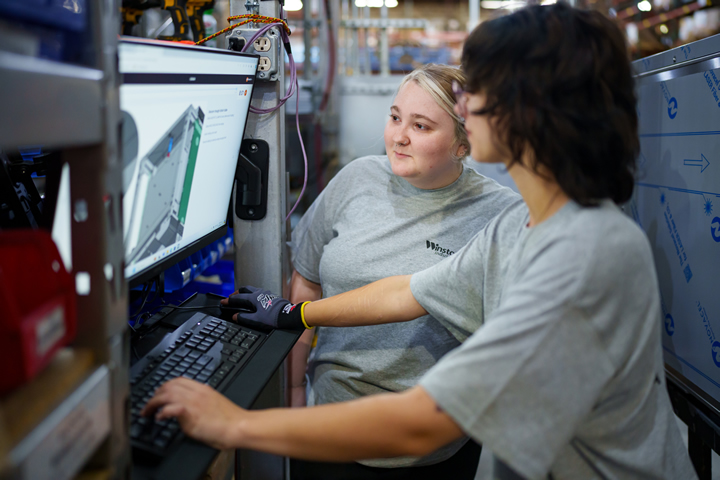Giving Blue-Collar Workers a Voice in Problem Solving - Without Slowing Production
Blue-collar workers interact daily with machines, materials, and processes, giving them a unique vantage point. Yet in many plants, their voices go unheard because reporting issues is slow, informal, or buried under paperwork.
How to Use AI to Close the Manufacturing Skills Gap
From smart training platforms to real-time job support, AI offers manufacturers a way to upskill current employees, optimize hiring and build a workforce ready for the future of production.
Tariffs, Reshoring and the Rising Demand for Entry-Level Labor
First up for employers amid revitalization of domestic manufacturing - tackling worker shortages in warehousing and logistics.
Wearable Robotics and Exoskeleton Technology
Through onboard intelligence and cloud connectivity, Exia delivers personalized support, injury prevention, and ergonomic optimization - essentially becoming a smart, adaptive partner for physical work.
From Displacement to Empowerment: How Robotics Developers Can Lead the Workforce Reskilling Revolution
As automation continues to integrate into our factories, warehouses, and supply chains, the conversation around workforce transition and reskilling has become one of the most urgent and defining challenges of our time.
From Tariffs to Talent: Why 70% of Manufacturers Say Workforce Enablement is Their Top Priority
Manufacturing executives point to a sector racing to meet the expected rising demand, yet they are struggling to hire, train, and retain the skilled labor essential for modern production.
Do Our Youth Hold the Key to Manufacturing's Skills Crisis?
Matt Eden, Engineering Director at cable assemblies manufacturer GTK, makes the case for answering the UK's skills gap problem with forward-thinking hiring practices.
In the industrial maintenance space, knowledge is key for employee retention
An investment in ongoing education is really an investment in your employees, and it can significantly boost engagement, morale, and retention.
Will AI Take My Job in Manufacturing?
While employees have every right to be sceptical about AI, it's important to note that integrating AI into existing workflows is actually in place to enhance productivity and remove the need for time-consuming manual tasks.
Strengthening the Workforce: The Growing Demand for Talent in Manufacturing
Skilled trades are experiencing a resurgence, presenting an opportunity for employers to invest in electricians, welders, and other technical professionals that are vital to the U.S. workforce.
Empowering the Next Generation of Manufacturing: How Digital Innovation is Shaping the Future Workforce
Today, Boomers still make up the majority of the industry's workforce, but as that generation quickly approaches retirement, their inevitable departure looms as a major disruption to the sector.
Developing the Talent to Lead US Manufacturing Tomorrow Starts Today
Reshoring efforts, a wave of retirements, and advancements requiring new skill sets have coalesced to create labor shortages throughout the sector, prompting 65 percent of manufactuers to say that attracting and retaining talent is their primary business challenge.
Shaping Tomorrow's Workforce
The workforce has changed too, as younger employees replace retirees. New strategies and resources are needed to ensure prospective hires possess the right skill set and that employers are prepared to recruit, develop, and retain productive, satisfied workers.
Decrease Downtime: Ergonomic Process for Healthier, More Productive Workplace
Preventing worker discomfort and addressing early signs of injury are proven to save companies time and money, all while improving worker satisfaction and reducing turnover.
Understanding What Makes Warehouse Workers Happy
This groundbreaking survey gathered insights from warehouse workers across the United States, exploring their daily challenges, what makes them happy, and what employers can do to improve working conditions.
Records 1 to 15 of 103
Featured Product

MRPeasy - ERP for Small Manufacturers That Delivers Results
Always know what you have in stock and what you'll need to fulfill orders. Never forget to order parts on time or fail to notice a late delivery from your vendor. Easily create manufacturing orders and schedule them automatically according to resource availability or delivery deadline. Generate accurate cost and lead time estimates and provide customers with quick quotes. Receive notifications when orders are late or inventory levels reach a critical point. Ensure seamless communication between sales, production, warehousing, procurement, administration, and finance. Integrate with popular accounting, CRM, and e-commerce apps. MRPeasy is an ERP software for small manufacturers that gives you all that and more. Our users report a 54% average improvement in the overall performance of their business and a 42% increase in on-time deliveries. Try for free, no credit card needed.
Manufacturing and Automation - Featured Company

CSP US Inc.
As a software manufacturer, CSP GmbH & Co. KG offers its customers bespoke solutions for the discrete manufacturing applications. This makes it easy to secure and document the quality of production processes - from development to delivery!



.jpg)






.jpg)




.jpg)